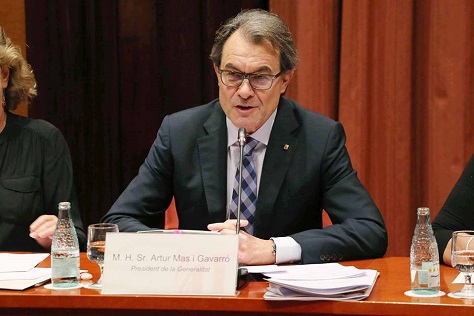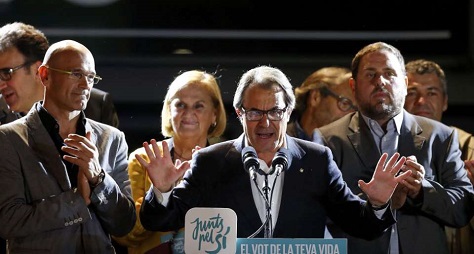
In the aftermath of a difficult national election that could well lead to fresh elections across all of Spain, Catalonia, the northeastern region with a swelling independence movement, was always set to be the largest puzzle piece that patches together any potential coalition to lead the national government. ![]()
![]()
Now the region will take center stage even more fully in Spain’s unfolding political drama, with a high-stakes game of chicken reaching its peak this week between regional president Artur Mas and the left-wing Candidatura d’Unitat Popular (CUP, Popular Unity Candidacy). The pro-independence CUP has refused to lend its support to the larger pro-independence coalition, Junts pel Sí (Together for Yes), the broad, pan-ideological group that won last September’s elections.
The CUP’s leaders have for months maintained that they will not — and politically cannot — support Mas, a center-right regional leader who has skillfully attached himself to a sovereigntist movement that’s now dominated by figures on the Catalan left. He’s the ideological heir to a political elite that, under his predecessor, Jordi Pujol (regional president from 1980 to 2003), became synonymous with corruption. Moreover, as regional president since 2010, Mas has introduced tax increases and budget cuts designed to keep the region’s fiscal condition from deteriorating, even as the wider Spanish economy collapsed, taking the Catalan regional economy with it.
* * * * *
RELATED: Madrid ignores Catalan vote at grave risk
RELATED: Catalan election results: pro-independence parties win narrow majority
RELATED: Three choices for new, fractured Spanish political landscape
* * * * *
On Sunday, the CUP — a radical left group that would oppose an independent Catalonia’s membership in either NATO or the European Union — reiterated that it cannot support Mas for regional president and that it will block investiture of Catalonia’s executive government, the Generalitat, forcing new spring elections, so long as Mas is determined to lead it. Indeed, Mas has refused to step aside. If no one budges between now and January 10, Catalonia will hold fresh elections (along, perhaps, with Spain after the fractured result of the December 20 national elections). For Catalans, it would be the fourth regional election in five years.
But if there’s one thing that Junts pel Sí doesn’t lack, it’s a deep bench of political leaders, each of whom could easily step in as a regional president far more amenable to the radical CUP and its supporters, thereby forming a truly broad pro-independence front. If Mas doesn’t back away in favor of another of his coalition’s leaders, fresh elections could actually leave Catalonia’s parliament even more divided, potentially setting back the independence movement that he claims to represent. And that should tell you exactly where Mas’s heart lies — in maintaining power at all costs, not seriously advancing an independent Catalonia.
By forcing spring elections, Mas risks, first, prolonging the process of building both a national Spanish government and a regional Catalan government, and, secondly, discrediting the independence movement itself. Continue reading Catalonia’s post-election future murky as Mas prioritizes power over secession


